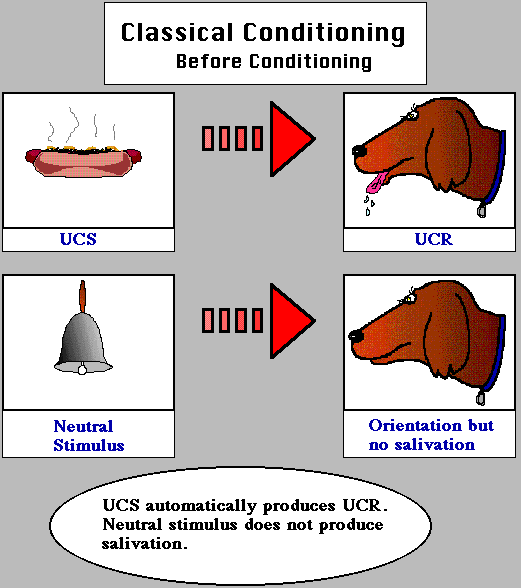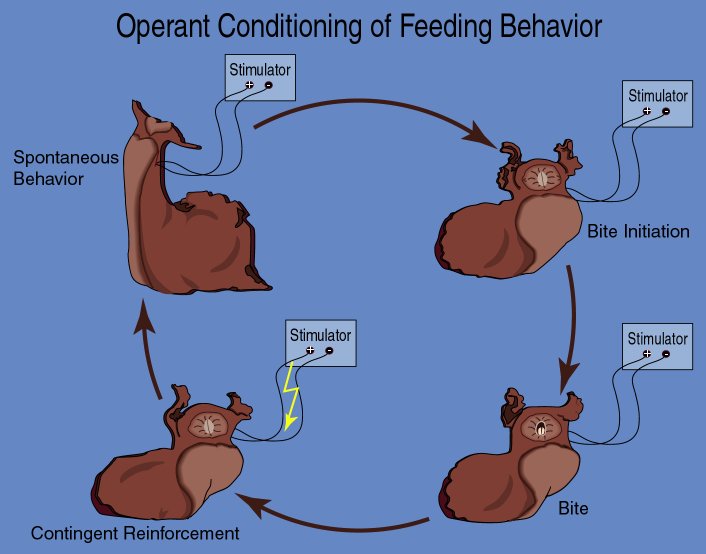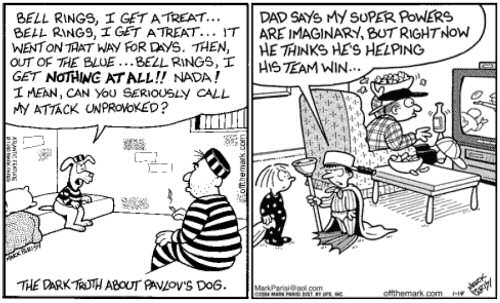|
Other articles:
|
 A type of training using all five principles of operant conditioning and a marker signal . . Clicker training is a subset of operant conditioning, .
Operant conditioning is a form of psychological learning where an individual modifies the occurrence and form of its own behavior due to the association of .
A behavior will increase if it is followed by positive reinforcement. It will decrease if it is followed by negative reinforcement.
operant conditioning definition. Function: n : conditioning in which the desired behavior or increasingly closer approximations to it are followed by a .
Operant conditioning can be defined as a type of learning in which . With Operant conditioning, the sound would occur, then the dog would have to perform .
File Format: Microsoft Powerpoint - Quick View
Operant conditioning, also called instrumental conditioning, is a method for modifying behavior (an operant) which utilizes contingencies between a .
A type of training using all five principles of operant conditioning and a marker signal . . Clicker training is a subset of operant conditioning, .
Operant conditioning is a form of psychological learning where an individual modifies the occurrence and form of its own behavior due to the association of .
A behavior will increase if it is followed by positive reinforcement. It will decrease if it is followed by negative reinforcement.
operant conditioning definition. Function: n : conditioning in which the desired behavior or increasingly closer approximations to it are followed by a .
Operant conditioning can be defined as a type of learning in which . With Operant conditioning, the sound would occur, then the dog would have to perform .
File Format: Microsoft Powerpoint - Quick View
Operant conditioning, also called instrumental conditioning, is a method for modifying behavior (an operant) which utilizes contingencies between a .
 Operant conditioning is a type of learning in which behavior becomes more or . Define operant conditioning. 2. Describe and give examples of the following .
Operant conditioning is a type of learning in which behavior becomes more or . Define operant conditioning. 2. Describe and give examples of the following .
 Operant conditioning involves learning from the consequences of our behaviour. BF Skinner wasn't the first psychologist to study learning by consequences.
Operant conditioning 4 min - Mar 20, 2007 - Uploaded by jenningh
Operant conditioning involves learning from the consequences of our behaviour. BF Skinner wasn't the first psychologist to study learning by consequences.
Operant conditioning 4 min - Mar 20, 2007 - Uploaded by jenningh

 Operant conditioning is so named because the subject “operates” on the environment. An early theory of operant conditioning, proposed by Edward Thorndike,
What procedure (choose either classical or operant conditioning) is being described or has probably resulted in the following behavior patterns? .
In operant conditioning, the subject operates on the environment. In this module , you will learn many of the fundamental principles about what variables .
Operant conditioning is the use of consequences to modify the occurrence and form of otherwise voluntary behaviour. Activities of the easel variety have .
Operant conditioning is one of the fundamental concepts in behavioral psychology . Learn more about the effects of rewards and punishments on behavior.
Sep 11, 2008 . The topic is training primates, also referred to as operant conditioning, depending upon who you talk to. Anyway, here is the list, .
Operant conditioning is so named because the subject “operates” on the environment. An early theory of operant conditioning, proposed by Edward Thorndike,
What procedure (choose either classical or operant conditioning) is being described or has probably resulted in the following behavior patterns? .
In operant conditioning, the subject operates on the environment. In this module , you will learn many of the fundamental principles about what variables .
Operant conditioning is the use of consequences to modify the occurrence and form of otherwise voluntary behaviour. Activities of the easel variety have .
Operant conditioning is one of the fundamental concepts in behavioral psychology . Learn more about the effects of rewards and punishments on behavior.
Sep 11, 2008 . The topic is training primates, also referred to as operant conditioning, depending upon who you talk to. Anyway, here is the list, .
 epsych.msstate.edu/adaptive/Fuzz/index.html - Cached - SimilarOperant Conditioning TermsOperant Conditioning: A type of learning in which the probability of a behavior recurring is increased or decreased by the consequences that follows. .
Operant conditioning is an important concept in psychology. Operant conditioning is a learning process that involve an increase or decrease in the .
epsych.msstate.edu/adaptive/Fuzz/index.html - Cached - SimilarOperant Conditioning TermsOperant Conditioning: A type of learning in which the probability of a behavior recurring is increased or decreased by the consequences that follows. .
Operant conditioning is an important concept in psychology. Operant conditioning is a learning process that involve an increase or decrease in the .
 The major theorists for the development of operant conditioning are Edward Thorndike, John Watson, and B. F. Skinner. This approach to behaviorism played a .
The major theorists for the development of operant conditioning are Edward Thorndike, John Watson, and B. F. Skinner. This approach to behaviorism played a .
 Aug 10, 2010 . Classical and Operant Conditioning Examples: 1. Every time someone flushes a toilet in the apartment building, the shower becomes very hot .
Using Operant Conditioning (OC) methods of training, emphasizing learning through Positive Reinforcement, Ali quickly learned to recall (voice and whistle ), .
We use the term operant (or instrumental) conditioning to describe one type of associative learning in which there is a contingency between a behavior (BH) .
Thomas E. Ludwig.
When people are frightened or angry, they will do what they have been conditioned to do. The same conditioning that allows pilots to handle their planes in .
Skinner's basic principle of operant conditioning is: "A response . What roles do stimulus generalization and discrimination play in operant conditioning? .
Aug 10, 2010 . Classical and Operant Conditioning Examples: 1. Every time someone flushes a toilet in the apartment building, the shower becomes very hot .
Using Operant Conditioning (OC) methods of training, emphasizing learning through Positive Reinforcement, Ali quickly learned to recall (voice and whistle ), .
We use the term operant (or instrumental) conditioning to describe one type of associative learning in which there is a contingency between a behavior (BH) .
Thomas E. Ludwig.
When people are frightened or angry, they will do what they have been conditioned to do. The same conditioning that allows pilots to handle their planes in .
Skinner's basic principle of operant conditioning is: "A response . What roles do stimulus generalization and discrimination play in operant conditioning? .


 Mar 21, 2004 . Operant Conditioning. Another type of learning, very similar to that discussed above, is called Operant Conditioning. The term "Operant" .
Mar 21, 2004 . Operant Conditioning. Another type of learning, very similar to that discussed above, is called Operant Conditioning. The term "Operant" .
 Skinner developed the basic concept of operant conditioning, claiming that this type of learning was not the result of stimulus-response learning - for .
Sep 18, 2008 . Operant conditioning (also known as instrumental conditioning) is a process by which humans and animals learn to behave in such a way as to .
Operant conditioning allows us to teach new behaviors and to increase the rates at which behaviors are emitted. Operants can be thought of as behaviors that .
Skinner developed the basic concept of operant conditioning, claiming that this type of learning was not the result of stimulus-response learning - for .
Sep 18, 2008 . Operant conditioning (also known as instrumental conditioning) is a process by which humans and animals learn to behave in such a way as to .
Operant conditioning allows us to teach new behaviors and to increase the rates at which behaviors are emitted. Operants can be thought of as behaviors that .


 Biology question: What are the differences between classical and operant conditioning theories? In classical conditioning a stimulus that already leads to a .
A process of behavior modification in which the likelihood of a specific behavior is increased or decreased through positive or negative reinforcement each .
Biology question: What are the differences between classical and operant conditioning theories? In classical conditioning a stimulus that already leads to a .
A process of behavior modification in which the likelihood of a specific behavior is increased or decreased through positive or negative reinforcement each .
 File Format: Microsoft Powerpoint - Quick View
File Format: PDF/Adobe Acrobat - Quick View
Operant Conditioning is the term used by B.F. Skinner to describe the effects of the consequences of a particular behavior on the future occurrence of that .
A quiz on the basic concepts of operant conditioning. - trivia quiz game. Play now!
File Format: PDF/Adobe Acrobat - Quick View
File Format: Microsoft Powerpoint - Quick View
File Format: PDF/Adobe Acrobat - Quick View
Operant Conditioning is the term used by B.F. Skinner to describe the effects of the consequences of a particular behavior on the future occurrence of that .
A quiz on the basic concepts of operant conditioning. - trivia quiz game. Play now!
File Format: PDF/Adobe Acrobat - Quick View
 File Format: PDF/Adobe Acrobat - Quick View
B. F. Skinner's entire system is based on operant conditioning. The organism is in the process of “operating” on the environment, which in ordinary terms .
This page presents the theories of Operant and Classical Conditioning, and explains how they can be applied for dog training and other animal training.
File Format: PDF/Adobe Acrobat - Quick View
B. F. Skinner's entire system is based on operant conditioning. The organism is in the process of “operating” on the environment, which in ordinary terms .
This page presents the theories of Operant and Classical Conditioning, and explains how they can be applied for dog training and other animal training.
 Definition of operant conditioning from the Merriam-Webster Online Dictionary with audio pronunciations, thesaurus, Word of the Day, and word games.
The distinctive characteristic of operant conditioning relative to previous forms of behaviorism (e.g., Thorndike, Hull) is that the organism can emit .
HOME. Operant Conditioning vs. Classical Conditioning. When dealing with behavior (learning or modifying) we are dealing with Operant Conditioning and .
An operant conditioning chamber (also known as the Skinner box) is a laboratory apparatus used in the experimental analysis of behavior to study animal .
Aug 10, 2010 . Explanation: This is operant conditioning because the behavior is voluntary and it was followed with a consequence. The behavior is driving .
How to Train your Cat,taming a feral cat,cat behavior,domestic cats,feral cat, aggressive cat behavior.
File Format: PDF/Adobe Acrobat - Quick View
Definition of operant conditioning from the Merriam-Webster Online Dictionary with audio pronunciations, thesaurus, Word of the Day, and word games.
The distinctive characteristic of operant conditioning relative to previous forms of behaviorism (e.g., Thorndike, Hull) is that the organism can emit .
HOME. Operant Conditioning vs. Classical Conditioning. When dealing with behavior (learning or modifying) we are dealing with Operant Conditioning and .
An operant conditioning chamber (also known as the Skinner box) is a laboratory apparatus used in the experimental analysis of behavior to study animal .
Aug 10, 2010 . Explanation: This is operant conditioning because the behavior is voluntary and it was followed with a consequence. The behavior is driving .
How to Train your Cat,taming a feral cat,cat behavior,domestic cats,feral cat, aggressive cat behavior.
File Format: PDF/Adobe Acrobat - Quick View
 File Format: PDF/Adobe Acrobat - Quick View
Apr 30, 2009 . Operant conditioning was pioneered by B.F. Skinner and built on the classical conditioning work of Ivan Pavlov. .
File Format: PDF/Adobe Acrobat - Quick View
Apr 30, 2009 . Operant conditioning was pioneered by B.F. Skinner and built on the classical conditioning work of Ivan Pavlov. .

 Operant Conditioning is one of the most significant contributions to learning science of the past 75 years. It was developed by B. F. Skinner and consists .
Sitemap
Operant Conditioning is one of the most significant contributions to learning science of the past 75 years. It was developed by B. F. Skinner and consists .
Sitemap
|









































